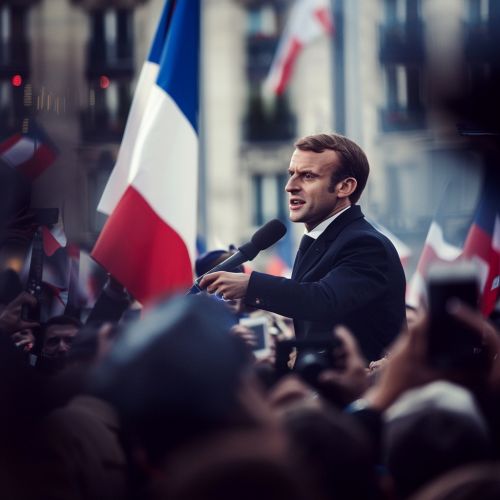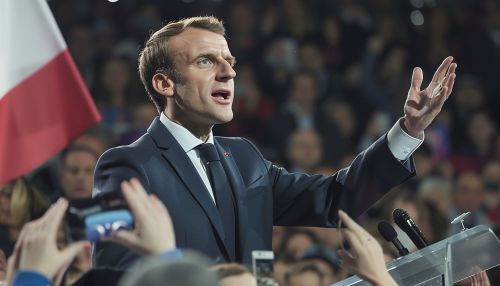Emmanuel Macron: Difference between revisions
(Created page with "== Early Life and Education == Emmanuel Jean-Michel Frédéric Macron was born on December 21, 1977, in Amiens, a city in northern France. His parents, Françoise Noguès, a physician, and Jean-Michel Macron, a professor of neurology, provided a nurturing and intellectually stimulating environment. Macron excelled academically from an early age, attending the prestigious Lycée La Providence in Amiens. He later moved to Paris to complete his high school education at the...") |
No edit summary |
||
| Line 21: | Line 21: | ||
In April 2016, Macron founded [[La République En Marche!|La République En Marche! (LREM)]], a centrist political movement aimed at bridging the traditional left-right divide in French politics. The movement quickly gained traction, attracting a diverse group of supporters from various political backgrounds. Macron's platform emphasized pro-European Union policies, economic liberalization, and social progressivism. | In April 2016, Macron founded [[La République En Marche!|La République En Marche! (LREM)]], a centrist political movement aimed at bridging the traditional left-right divide in French politics. The movement quickly gained traction, attracting a diverse group of supporters from various political backgrounds. Macron's platform emphasized pro-European Union policies, economic liberalization, and social progressivism. | ||
[[Image:Detail-91471.jpg|thumb|center|Emmanuel Macron speaking at a campaign rally, addressing a crowd with enthusiasm.|class=only_on_mobile]] | |||
[[Image:Detail-91472.jpg|thumb|center|Emmanuel Macron speaking at a campaign rally, addressing a crowd with enthusiasm.|class=only_on_desktop]] | |||
== Presidential Campaign and Election == | == Presidential Campaign and Election == | ||
Latest revision as of 03:01, 21 June 2024
Early Life and Education
Emmanuel Jean-Michel Frédéric Macron was born on December 21, 1977, in Amiens, a city in northern France. His parents, Françoise Noguès, a physician, and Jean-Michel Macron, a professor of neurology, provided a nurturing and intellectually stimulating environment. Macron excelled academically from an early age, attending the prestigious Lycée La Providence in Amiens. He later moved to Paris to complete his high school education at the Lycée Henri-IV, known for its rigorous academic standards.
Macron pursued higher education at the University of Paris Nanterre, where he studied philosophy. His thesis focused on the political philosophy of Machiavelli and Hegel, showcasing his deep interest in political theory. Following his philosophy degree, Macron attended the elite Sciences Po in Paris, where he studied public affairs. He then completed his education at the École Nationale d'Administration (ENA), a prestigious institution that has produced many of France's top civil servants and politicians.
Early Career
Upon graduating from ENA in 2004, Macron began his career in the French civil service. He joined the Inspection Générale des Finances, a body responsible for auditing and advising the French government on financial matters. During his tenure, Macron gained a reputation for his analytical skills and his ability to navigate complex financial landscapes.
In 2008, Macron transitioned to the private sector, joining the investment bank Rothschild & Cie. At Rothschild, he quickly rose through the ranks, becoming a managing director. One of his most notable achievements was advising on the acquisition of Pfizer's baby food division by Nestlé, a deal valued at over $11 billion. This success bolstered his reputation as a skilled negotiator and financier.
Entry into Politics
Macron's political career began in earnest in 2012 when he was appointed Deputy Secretary-General of the Élysée Palace under President François Hollande. In this role, he was a key advisor on economic policy and played a significant role in shaping the government's response to the Eurozone crisis.
In 2014, Macron was appointed Minister of Economy, Industry, and Digital Affairs. During his tenure, he introduced several reforms aimed at liberalizing the French economy. These included the Macron Law, which sought to reduce regulatory barriers and increase competition in various sectors. The law faced significant opposition but was eventually passed using a special constitutional provision known as Article 49.3.
Formation of La République En Marche!
In April 2016, Macron founded La République En Marche! (LREM), a centrist political movement aimed at bridging the traditional left-right divide in French politics. The movement quickly gained traction, attracting a diverse group of supporters from various political backgrounds. Macron's platform emphasized pro-European Union policies, economic liberalization, and social progressivism.


Presidential Campaign and Election
Macron announced his candidacy for the French presidency in November 2016. His campaign focused on themes of renewal and unity, positioning himself as an outsider to the traditional political establishment. Despite initial skepticism, Macron's message resonated with a broad segment of the electorate.
In the first round of the 2017 French presidential election, Macron received the highest number of votes, advancing to the runoff against Marine Le Pen, the candidate of the far-right National Front. In the second round, Macron won decisively, securing 66.1% of the vote. At 39, he became the youngest President in French history.
Presidency
Domestic Policy
Upon taking office, Macron faced numerous challenges, including high unemployment, social unrest, and a sluggish economy. His administration introduced several reforms aimed at revitalizing the French economy. These included changes to labor laws to make hiring and firing easier, tax cuts for businesses and individuals, and efforts to reduce public spending.
One of Macron's most controversial domestic policies was the Yellow Vest Movement protests, which began in late 2018. The protests were initially sparked by a proposed fuel tax but quickly grew to encompass broader grievances about economic inequality and the cost of living. Macron's response included a series of concessions, such as canceling the fuel tax increase and announcing measures to boost the purchasing power of low-income households.
Foreign Policy
Macron has been a vocal advocate for a stronger and more integrated European Union (EU). He has called for reforms to the EU's governance structures, including the creation of a common budget and a European finance minister. Macron has also emphasized the importance of maintaining strong transatlantic relations, particularly in the face of rising geopolitical tensions.
In terms of defense policy, Macron has supported increased military spending and greater cooperation among EU member states. He has also been a proponent of the Paris Agreement on climate change and has called for more ambitious global efforts to combat climate change.
Social Policy
Macron's social policies have focused on education, healthcare, and social inclusion. His administration has introduced reforms aimed at improving the quality of education, including measures to reduce class sizes in primary schools and increase funding for vocational training. In healthcare, Macron has sought to address issues such as medical deserts (areas with insufficient healthcare services) and improve access to care for all citizens.
Macron has also been a strong advocate for gender equality and LGBTQ+ rights. His administration has introduced measures to combat domestic violence, promote equal pay, and support the rights of LGBTQ+ individuals.
Challenges and Criticisms
Despite his achievements, Macron's presidency has not been without controversy. His economic reforms have faced significant opposition from labor unions and left-wing parties, who argue that they disproportionately benefit the wealthy. The Yellow Vest Movement protests highlighted deep-seated social and economic divisions within French society.
Macron has also faced criticism for his leadership style, which some perceive as aloof and technocratic. His use of executive orders to pass controversial legislation has been seen by some as undermining democratic processes.
Personal Life
Emmanuel Macron is married to Brigitte Trogneux, a former high school teacher. The couple met when Macron was a student at the Lycée La Providence, where Brigitte was his drama teacher. Despite a significant age difference, they married in 2007 and have been a prominent and supportive couple throughout Macron's political career.
Legacy and Impact
As of the writing of this article, Macron's legacy is still being shaped. His presidency has been marked by ambitious reforms and significant challenges. Whether his policies will lead to long-term economic growth and social cohesion remains to be seen. However, his impact on French politics is undeniable, having disrupted the traditional party system and introduced a new centrist movement.
